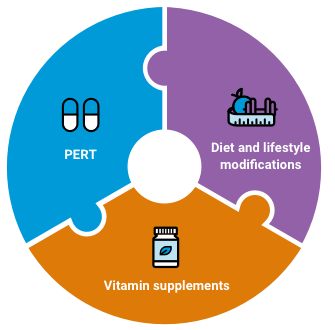Lipase
breaks down fats
Although EPI (exocrine pancreatic insufficiency) can be chronic, it is usually a manageable condition. If you are diagnosed with EPI, your doctor will work with you to create a management plan that fits your needs. Management plans usually include pancreatic enzyme replacement therapy (PERT) and vitamin supplements, and sometimes adjustments to your diet.

Pancreatic Enzyme Replacement Therapy
In people with EPI, PERTs replace the 3 main digestive enzymes that the pancreas normally produces:
breaks down fats
breaks down carbohydrates (sugars)
breaks down proteins

Because PERTs help you digest food, they need to be taken every time you eat—with every meal and snack.

In addition to PERTs, your doctor may recommend taking vitamin supplements since EPI can make it hard to absorb vitamins from food—specifically fat-soluble vitamins (A, D, E, and K). When it comes to EPI, eating a well-balanced diet is crucial. Consulting with a nutritionist is a good way to make sure all of your dietary needs are being met.
It's also important to adopt healthy habits, which can include limiting alcohol intake and quitting smoking.

Whether you're on CREON or exploring your treatment options, you can sign up for resources and educational materials delivered directly to you.
CREON® (pancrelipase) is a prescription medicine used to treat people who cannot digest food normally because their pancreas does not make enough enzymes.
What is the most important information I should know about CREON?
CREON may increase your chance of having a rare bowel disorder called fibrosing colonopathy. The risk of having this condition may be reduced by following the dosing instructions that your healthcare professional (HCP) gave you. Call your HCP right away if you have any unusual or severe: stomach area (abdominal) pain, bloating, trouble passing stool, nausea, vomiting, or diarrhea.
What should I tell my HCP before taking CREON?
Before taking CREON, tell your HCP about all the medicines you take and all your medical conditions, including if you are allergic to pork (pig) products; have a history of intestinal blockage or scarring or thickening of your bowel wall (fibrosing colonopathy), gout, kidney disease, or high blood uric acid (hyperuricemia); or are pregnant, plan to become pregnant, are breastfeeding, or plan to breastfeed.
How should I take CREON?
Take CREON exactly as your HCP tells you. Always take CREON with a meal or snack and enough liquid to swallow CREON completely. Do not crush or chew the CREON capsule or its contents, as this may cause irritation in your mouth or change the way CREON works in your body. Talk to your HCP or consult the CREON Medication Guide for how to take CREON if you have trouble swallowing capsules.
What are the possible side effects of CREON?
CREON may cause additional serious side effects, including:
Call your HCP right away if you have any of these symptoms.
The most common side effects of CREON include blood sugar increase (hyperglycemia) or decrease (hypoglycemia), pain in your stomach, frequent or abnormal bowel movements, gas, vomiting, dizziness, sore throat, and cough.
CREON and other pancreatic enzyme products are made from the pancreas of pigs, the same pigs people eat as pork. These pigs may carry viruses. Although it has never been reported, it may be possible for a person to get a viral infection from taking pancreatic enzyme products that come from pigs.
These are not all the possible side effects of CREON. For more information, ask your HCP or pharmacist.
You are encouraged to report negative side effects of prescription drugs to the FDA. Visit www.fda.gov/medwatch or call 1‑800‑FDA‑1088.
If you are having difficulty paying for your medicine, AbbVie may be able to help. Visit AbbVie.com/PatientAccessSupport to learn more.
US-CREO-230451